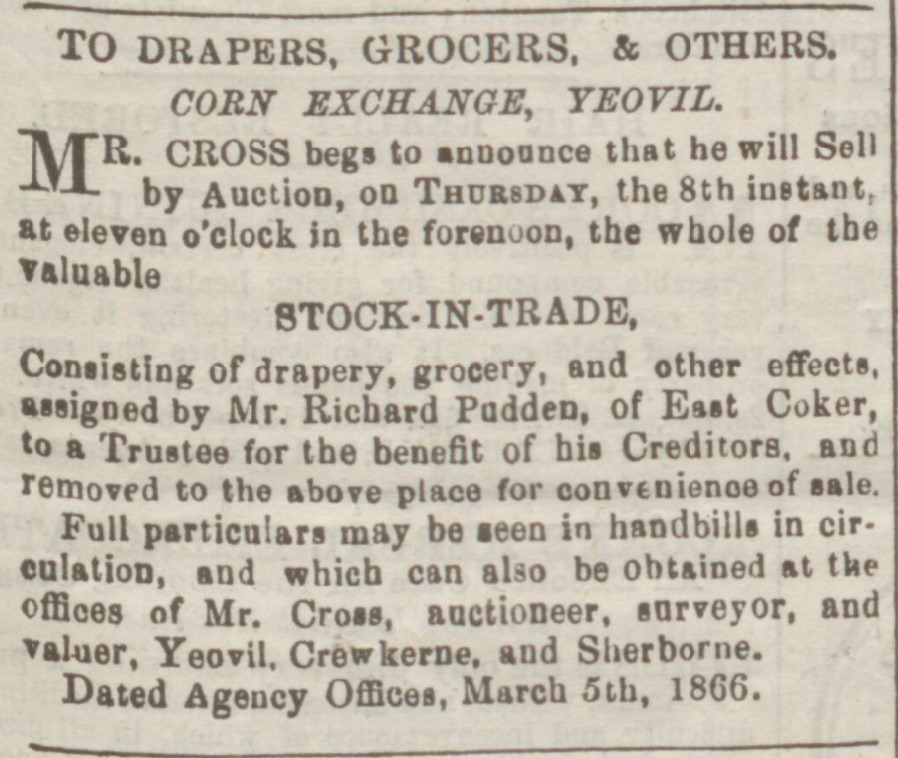Introduction
Richard Pudden’s life story is one of struggle as he attempted to make a living from village shops, ultimately facing failure. He ran a shop in East Coker from 1864 until around 1887, before briefly running a shop in Hardington in the late 1880s. After that, he returned to East Coker to work as an employee in another shop. Business difficulties, along with the deaths of two of their children, may have contributed to his wife’s mental health issues in her fifties. His eldest son enlisted in the Somerset Light Infantry and later emigrated to Canada; his second son became a schoolteacher, and his daughter, Phillis, worked as an assistant matron. Notably, four of Richard’s children never married.
Early life at East Coker
Richard Pudden was born in East Coker around 1842, the son of Richard Pudden, a labourer, and his wife, Ann (née Mudford), who lived at Coker Marsh.
Richard entered the retail trade at a young age. By April 1861, he was an assistant living in the household of a draper and grocer at Yetminster.
A shopkeeper at East Coker
When he was twenty-two, Richard made an advantageous marriage. On 5 July 1864, he married Mary Booby, whose widowed mother, Phillis, ran a shop at North Coker. Richard took over the running of the shop, with Phillis continuing to live there until her death in June 1877.
It was not long before Richard was in financial difficulties. On 8 March 1866, an auctioneer named Cross held a sale at the Corn Exchange, Yeovil, to sell all of Richard’s stock for the benefit of his creditors.[1]
Despite this setback, Richard’s business survived, as evidenced by the 1871 census, which recorded him as a grocer at North Coker.
Tragedy struck in June 1872 when his seven-year-old daughter, Ada Susan, passed away. Five years later, they suffered another loss with the death of their three-year-old son, Sidney Richard.
Like many other traders of the time, Richard engaged in dishonest practices. In September 1874, he was summoned for selling adulterated mustard, and in May 1875, he was fined £2 and ordered to pay costs of 7s 6d for having faulty scales.[2]
Despite this dubious conduct, by April 1881, Richard was also the village postmaster.
However, he still struggled financially, and in December 1885, he advertised the shop and post office as available to let.[3]
Move to Hardington
In about 1887, Richard, Mary and their six surviving children moved to Hardington, where they occupied a house in the High Street until about 1890. [4] Richard must have run a shop there, as he was fined 2s 6d and costs in August 1887 for having faulty weights.[5]
Return to East Coker
By April 1891, Richard was unemployed and living at Isles, East Coker, with his two youngest daughters, Ann and Frances. His wife, Mary, had become a patient at the Somerset Asylum, Wells.
By March 1901, Richard had moved to Up Coker, where he found work as a grocer’s assistant. His two daughters, Ann and Frances, continued to live with him, and his wife had returned home.
Death
Richard died in 1908 at the age of 65.
Mary’s later life
After Richard’s death, Mary and her daughters, Ann and Frances, moved in with their youngest son, Hedley, who was a grocer’s manager at Castle Cary. Mary died there in 1913 at the age of 75.
Children
Richard and Mary had four sons and four daughters.
Their eldest son, Herbert Henry, enlisted in the Somerset Light Infantry in January 1886 and later emigrated to Canada. Their second son, George, became a schoolmaster in London. Their third son, Sidney Richard, died at the age of three. The family’s fourth son, Hedley Joseph, worked as a grocer’s manager at Castle Cary and subsequently at Frome.
In June 1887, their daughter, Phillis Amelia, placed an advertisement in the Western Gazette seeking a cashier position in a business house. In April 1891, she was a manageress at 38 High Street, Dorchester; in March 1901, she was working as an assistant in a restaurant at Dorchester; and, in April 1911, she held the position of assistant matron in a Soldiers’ Home at Dorchester. By June 1921, Phillis was a domestic servant in Elm Park Road, Pinner.
By September 1939, Phillis had joined her brother, Hedley, and her sisters, Ann and Francis, at Frome. These four siblings never married. Ann and Phillis died in 1947, Hedley in 1952, and Frances in 1960.
References
[1] Sherborne Mercury, 6 March 1866, p.1.
[2] Bristol Times and Mirror, 3 September 1874, p.4; Western Gazette, 7 May 1875, p.8; 14 May 1875, p.8.
[3] Western Gazette, 4 December 1885, p.4.
[4] Hardington voters’ lists.
[5] Western Gazette,5 August 1887, p.6.

